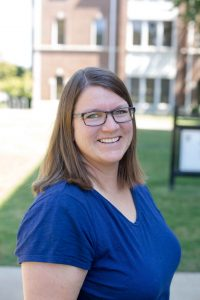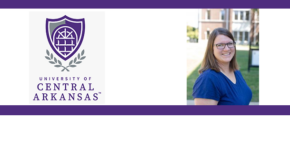 On University of Central Arkansas Week: Healthcare care workers can be exposed to many different things during their work.
On University of Central Arkansas Week: Healthcare care workers can be exposed to many different things during their work.
Denise Demers, associate professor in the department of health sciences, finds ways to make the best workers for the future.
Dr. Denise Demers is an Assistant Professor in the Department of Health Sciences. She graduated from Southern Illinois University Carbondale with her PhD in Health Education, received her Masters in Exercise Physiology/Health and Fitness Promotion from Brigham Young University, and her BS degree in Physical Education from Southern Utah University. Dr. Demers is a Certified Health Education Specialist and teaches undergraduate-level Program Planning and Evaluation, Mental Health, and Health Communication and Advocacy. She also teaches graduate-level Foundations of Health Promotion, Health Communication and Advocacy, Health Concerns of the Aging, and International Health. Dr. Demers also takes students to Vienna, Austria and the surrounding countries for a Study Abroad experience each summer. While there, students can take classes including Field Experience in Health Promotion (undergraduate and graduate), Study Abroad Seminar (undergraduate Lower Division Core), and International Health (graduate). She also serves as a student advisor and works with students who are interested in Directed Independent Research, Honors Research, Masters & Doctoral Research.
Health Profession Students Interprofessional Collaboration Competencies
As health profession educators, we know that it is important to prepare students to work in a wide variety of situations. During this pandemic, we are well aware of the varying dynamics in which health care workers are exposed. With this complexity, it is essential for students to learn collaborative methods that enhance our health care system.
Over the course of two semesters, we met with other campus and community service leaders in an intersection of both Interprofessional Education (IPE) and Service-Learning (SL) to create a campus-wide service-learning event where more than 300 Special Olympic Athletes and their families arrived on campus to attend a unified sports weekend. This event allowed students to develop the necessary skills, attitudes, and behaviors that promote patient-centered care in team-based models.
We were interested to know whether students who engaged in an Interprofessional Service-Learning project were more confident in working together, were less apprehensive of working with individuals with disabilities, and if they felt they learned more in the classroom or at such an event.
The weekend event included opening ceremonies, athletic competitions, a health promotion event, as well as health screenings where students from three different health centered departments shared ideas and developed various activities. Using qualitative interview techniques, we found that students indeed did feel more confident working with other health professions. They also felt more at ease working with people with disabilities. Lastly, nearly all students felt like this Interprofessional Service-Learning project provided a more robust and better learning environment than a traditional classroom.
